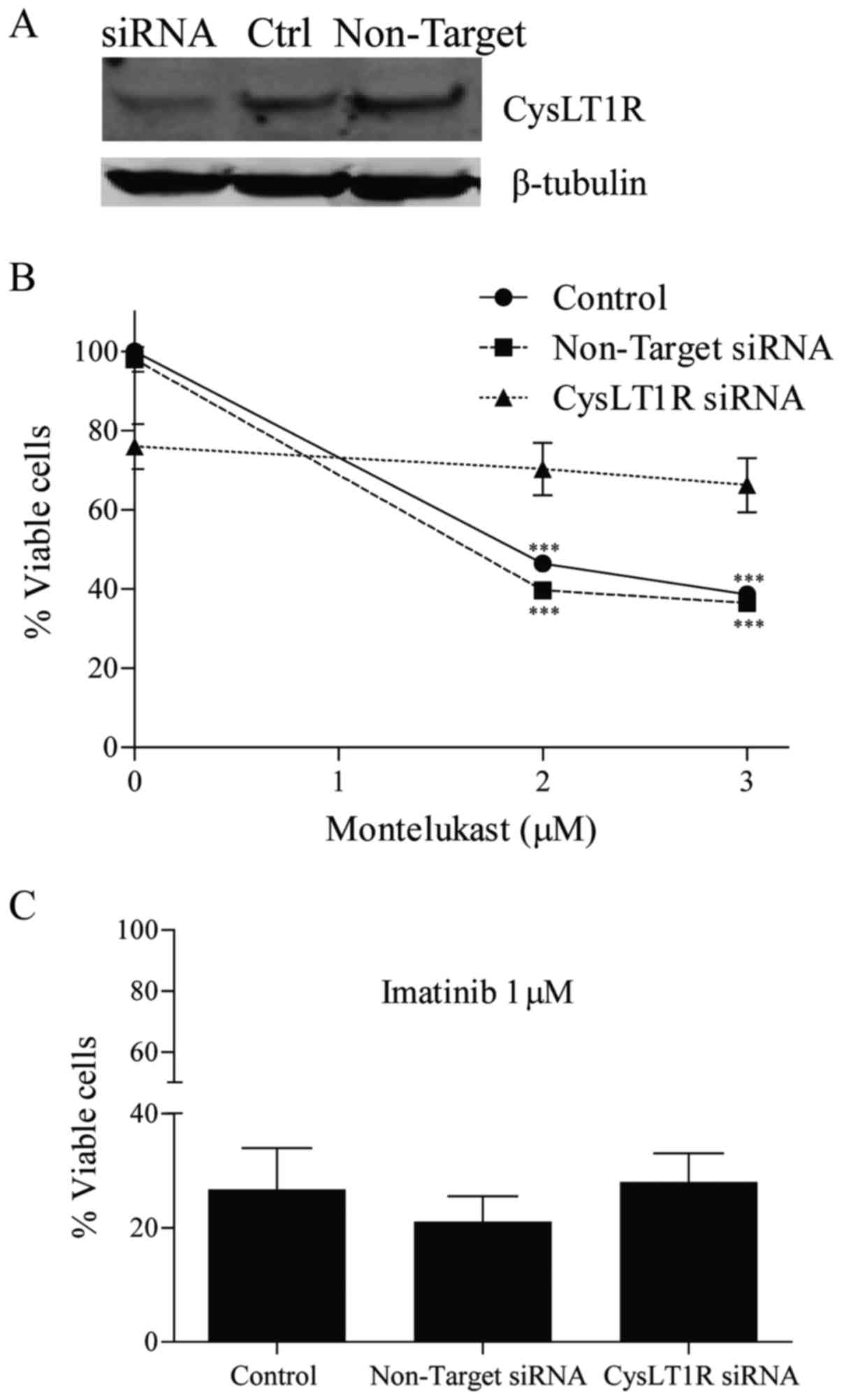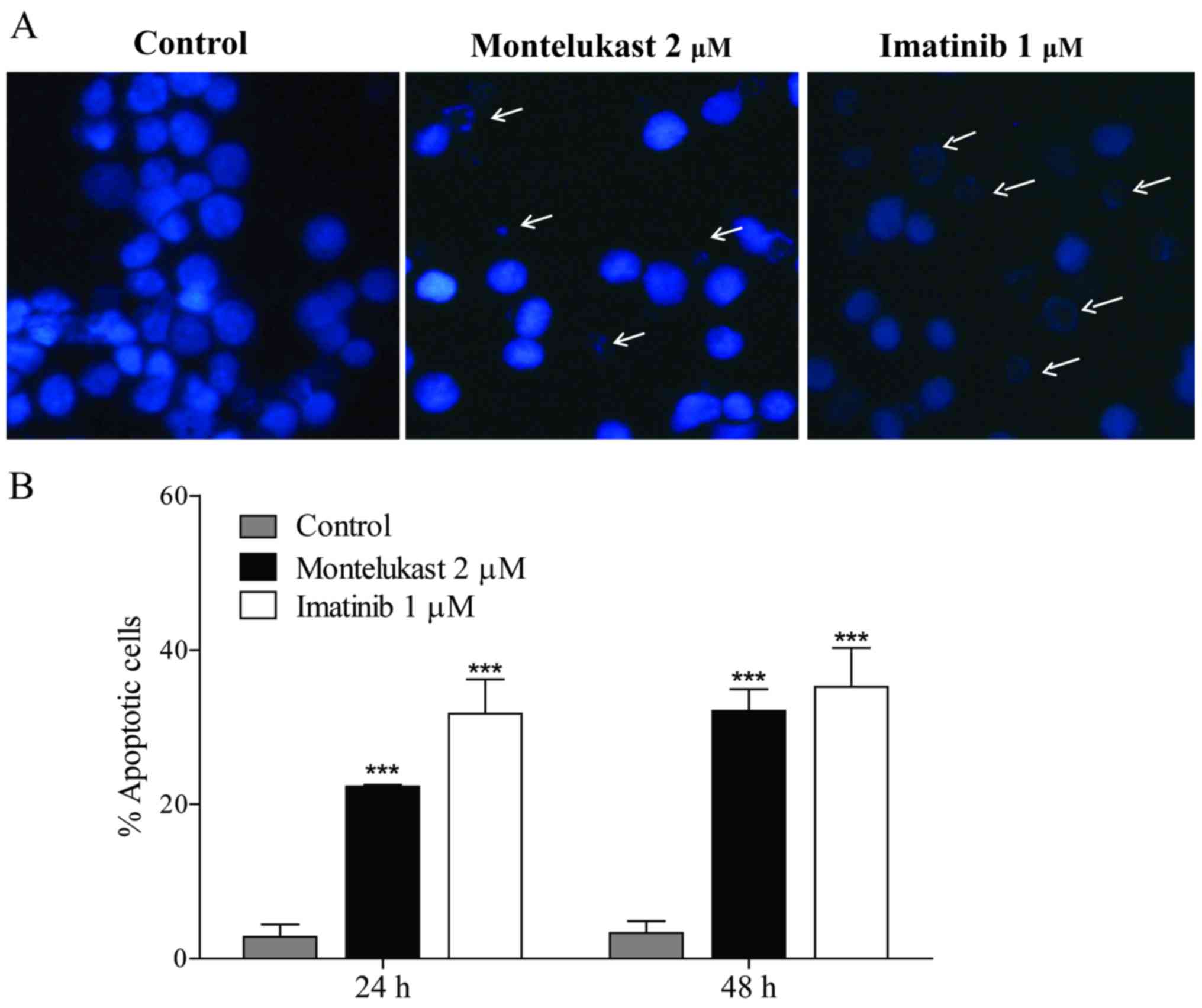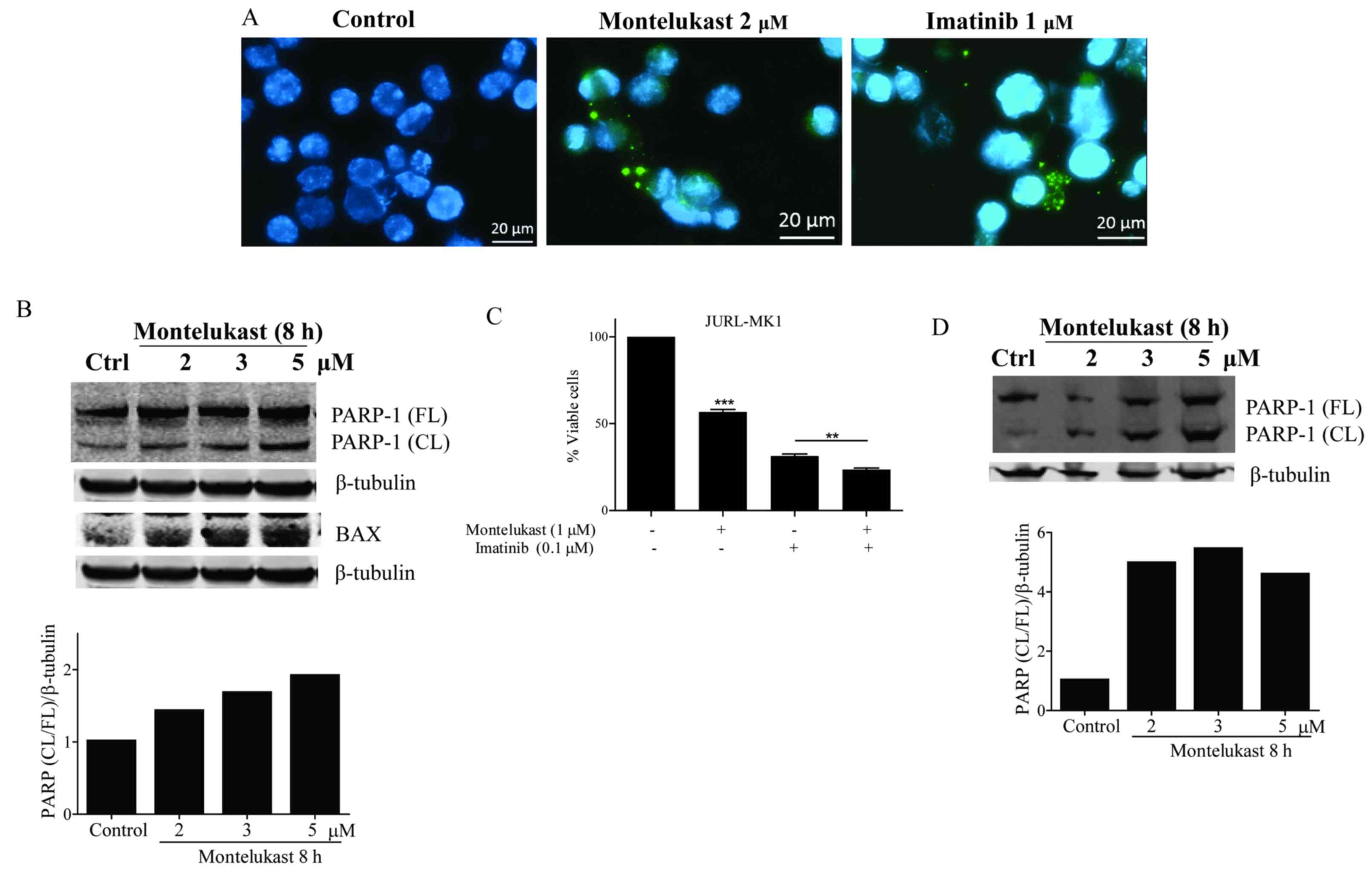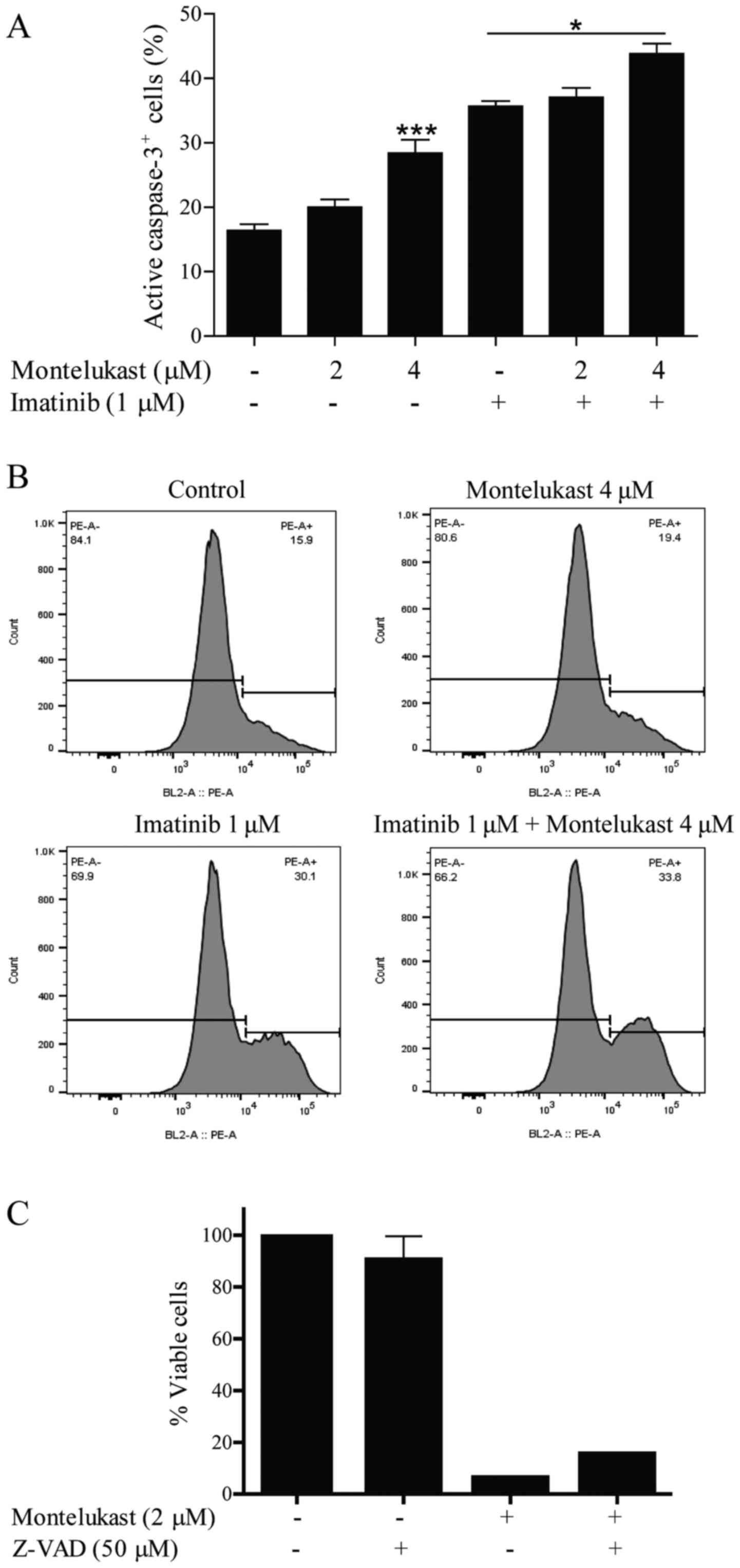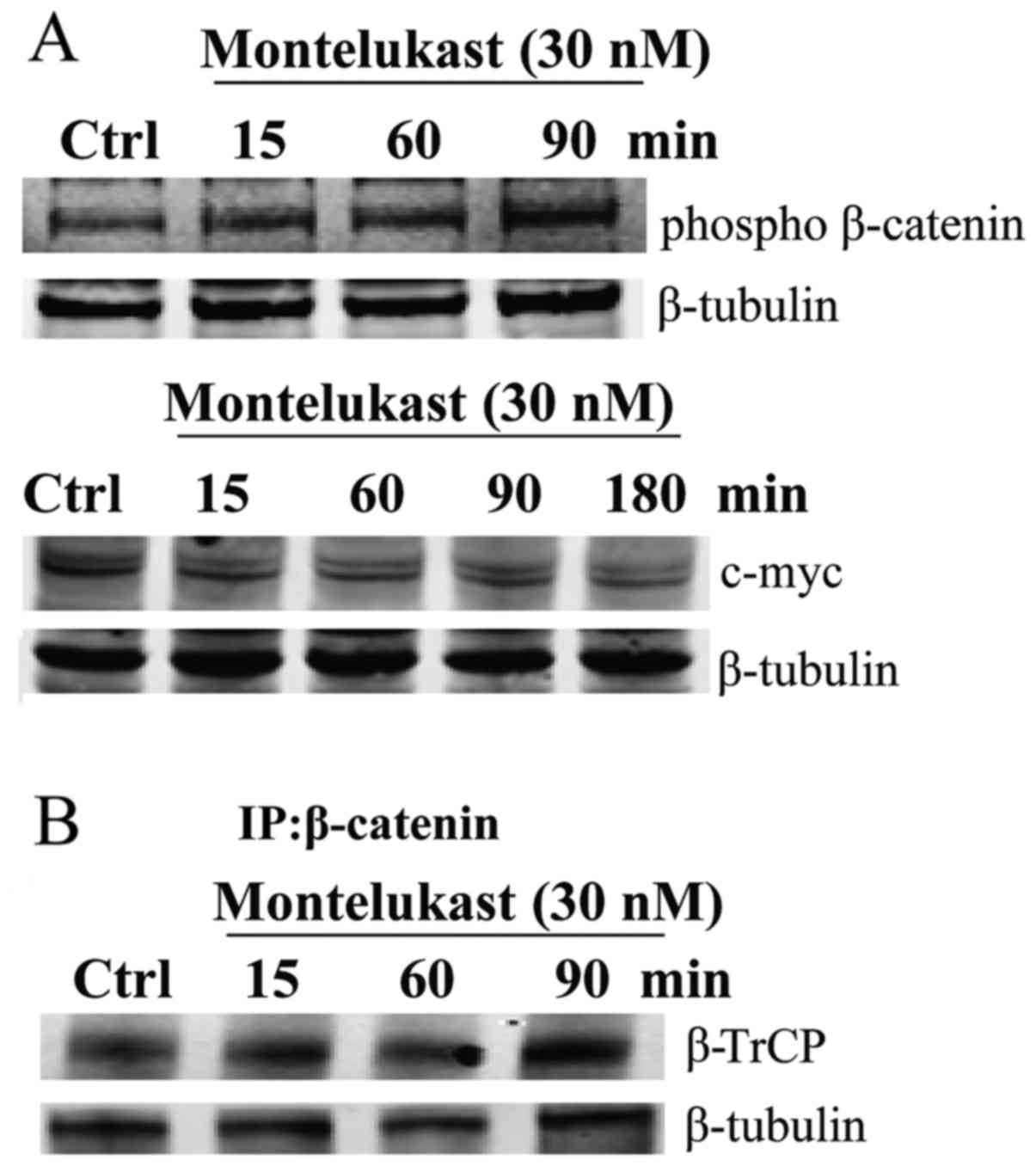|
1
|
Heisterkamp N, Stam K, Groffen J, de Klein
A and Grosveld G: Structural organization of the bcr gene and its
role in the Ph' translocation. Nature. 315:758–761. 1985.
View Article : Google Scholar : PubMed/NCBI
|
|
2
|
Hoglund M, Sandin F, Hellström K, Björeman
M, Björkholm M, Brune M, Dreimane A, Ekblom M, Lehmann S, Ljungman
P, et al: Tyrosine kinase inhibitor usage, treatment outcome, and
prognostic scores in CML: Report from the population-based Swedish
CML registry. Blood. 122:pp. 1284–1292. 2013, View Article : Google Scholar : PubMed/NCBI
|
|
3
|
Gambacorti-Passerini C, Antolini L, Mahon
FX, Guilhot F, Deininger M, Fava C, Nagler A, Della Casa CM, Morra
E, Abruzzese E, et al: Multicenter independent assessment of
outcomes in chronic myeloid leukemia patients treated with
imatinib. J Natl Cancer Inst. 103:553–561. 2011. View Article : Google Scholar : PubMed/NCBI
|
|
4
|
Morotti A, Panuzzo C, Fava C and Saglio G:
Kinase-inhibitor-insensitive cancer stem cells in chronic myeloid
leukemia. Expert Opin Biol Ther. 14:287–299. 2014. View Article : Google Scholar : PubMed/NCBI
|
|
5
|
Funk CD: Prostaglandins and leukotrienes:
Advances in eicosanoid biology. Science. 294:1871–1875. 2001.
View Article : Google Scholar : PubMed/NCBI
|
|
6
|
Chen Y, Hu Y, Zhang H, Peng C and Li S:
Loss of the Alox5 gene impairs leukemia stem cells and
prevents chronic myeloid leukemia. Nat Genet. 41:783–792. 2009.
View Article : Google Scholar : PubMed/NCBI
|
|
7
|
Chen Y, Li D and Li S: The Alox5
gene is a novel therapeutic target in cancer stem cells of chronic
myeloid leukemia. Cell Cycle. 8:3488–3492. 2009. View Article : Google Scholar : PubMed/NCBI
|
|
8
|
Peters-Golden M, Gleason MM and Togias A:
Cysteinyl leukotrienes: Multi-functional mediators in allergic
rhinitis. Clin Exp Allergy. 36:689–703. 2006. View Article : Google Scholar : PubMed/NCBI
|
|
9
|
Ohd JF, Nielsen CK, Campbell J, Landberg
G, Löfberg H and Sjölander A: Expression of the leukotriene D4
receptor CysLT1, COX-2, and other cell survival factors in
colorectal adenocarcinomas. Gastroenterology. 124:57–70. 2003.
View Article : Google Scholar : PubMed/NCBI
|
|
10
|
Matsuyama M and Yoshimura R:
Cysteinyl-leukotriene1 receptor is a potent target for the
prevention and treatment of human urological cancer. Mol Med Rep.
3:245–251. 2010.PubMed/NCBI
|
|
11
|
Burke L, Butler CT, Murphy A, Moran B,
Gallagher WM, O'Sullivan J and Kennedy BN: Evaluation of cysteinyl
leukotriene signaling as a therapeutic target for colorectal
cancer. Front Cell Dev Biol. 4:1032016. View Article : Google Scholar : PubMed/NCBI
|
|
12
|
Magnusson C, Liu J, Ehrnström R, Manjer J,
Jirström K, Andersson T and Sjölander A: Cysteinyl leukotriene
receptor expression pattern affects migration of breast cancer
cells and survival of breast cancer patients. Int J Cancer.
129:9–22. 2011. View Article : Google Scholar : PubMed/NCBI
|
|
13
|
Zhang WP, Hu H, Zhang L, Ding W, Yao HT,
Chen KD, Sheng WW, Chen Z and Wei EQ: Expression of cysteinyl
leukotriene receptor 1 in human traumatic brain injury and brain
tumors. Neurosci Lett. 363:247–251. 2004. View Article : Google Scholar : PubMed/NCBI
|
|
14
|
Virchow JC and Bachert C: Efficacy and
safety of montelukast in adults with asthma and allergic rhinitis.
Respir Med. 100:1952–1959. 2006. View Article : Google Scholar : PubMed/NCBI
|
|
15
|
Matsuyama M, Funao K, Hayama T, Tanaka T,
Kawahito Y, Sano H, Takemoto Y, Nakatani T and Yoshimura R:
Relationship between cysteinyl-leukotriene-1 receptor and human
transitional cell carcinoma in bladder. Urology. 73:916–921. 2009.
View Article : Google Scholar : PubMed/NCBI
|
|
16
|
Matsuyama M, Hayama T, Funao K, Kawahito
Y, Sano H, Takemoto Y, Nakatani T and Yoshimura R: Overexpression
of cysteinyl LT1 receptor in prostate cancer and CysLT1R antagonist
inhibits prostate cancer cell growth through apoptosis. Oncol Rep.
18:99–104. 2007.PubMed/NCBI
|
|
17
|
Funao K, Matsuyama M, Naganuma T, Kawahito
Y, Sano H, Nakatani T and Yoshimura R: The cysteinylLT1 receptor in
human renal cell carcinoma. Mol Med Rep. 1:185–189. 2008.PubMed/NCBI
|
|
18
|
Savari S, Liu M, Zhang Y, Sime W and
Sjölander A: CysLT(1)R antagonists inhibit tumor growth in a
xenograft model of colon cancer. PLoS One. 8:e734662013. View Article : Google Scholar : PubMed/NCBI
|
|
19
|
Sveinbjörnsson B, Rasmuson A, Baryawno N,
Wan M, Pettersen I, Ponthan F, Orrego A, Haeggström JZ, Johnsen JI
and Kogner P: Expression of enzymes and receptors of the
leukotriene pathway in human neuroblastoma promotes tumor survival
and provides a target for therapy. FASEB J. 22:3525–3536. 2008.
View Article : Google Scholar : PubMed/NCBI
|
|
20
|
Piromkraipak P, Sangpairoj K, Tirakotai W,
Chaithirayanon K, Unchern S, Supavilai P, Power C and Vivithanaporn
P: Cysteinyl leukotriene receptor antagonists inhibit migration,
invasion, and expression of MMP-2/9 in human glioblastoma. Cell Mol
Neurobiol. 38:559–573. 2018. View Article : Google Scholar : PubMed/NCBI
|
|
21
|
Stenke L, Mansour M, Reizenstein P and
Lindgren JA: Stimulation of human myelopoiesis by leukotrienes B4
and C4: interactions with granulocyte-macrophage colony-stimulating
factor. Blood. 81:352–356. 1993.PubMed/NCBI
|
|
22
|
Stenke L, Samuelsson J, Palmblad J,
Dabrowski L, Reizenstein P and Lindgren JA: Elevated white blood
cell synthesis of leukotriene C4 in chronic myelogenous leukaemia
but not in polycythaemia vera. Br J Haematol. 74:257–263. 1990.
View Article : Google Scholar : PubMed/NCBI
|
|
23
|
Yektaei-Karin E, Zovko A, Nilsson A,
Näsman-Glaser B, Kanter L, Rådmark O, Wallvik J, Ekblom M, Dolinska
M, Qian H, et al: Modulation of leukotriene signaling inhibiting
cell growth in chronic myeloid leukemia. Leuk Lymphoma.
58:1903–1913. 2017. View Article : Google Scholar : PubMed/NCBI
|
|
24
|
Zhao C, Blum J, Chen A, Kwon HY, Jung SH,
Cook JM, Lagoo A and Reya T: Loss of beta-catenin impairs the
renewal of normal and CML stem cells in vivo. Cancer Cell.
12:528–541. 2007. View Article : Google Scholar : PubMed/NCBI
|
|
25
|
Heidel FH, Bullinger L, Feng Z, Wang Z,
Neff TA, Stein L, Kalaitzidis D, Lane SW and Armstrong SA: Genetic
and pharmacologic inhibition of β-catenin targets
imatinib-resistant leukemia stem cells in CML. Cell Stem Cell.
10:412–424. 2012. View Article : Google Scholar : PubMed/NCBI
|
|
26
|
Reed JC: Proapoptotic multidomain
Bcl-2/Bax-family proteins: Mechanisms, physiological roles, and
therapeutic opportunities. Cell Death Differ. 13:1378–1386. 2006.
View Article : Google Scholar : PubMed/NCBI
|
|
27
|
Savari S, Vinnakota K, Zhang Y and
Sjölander A: Cysteinyl leukotrienes and their receptors: Bridging
inflammation and colorectal cancer. World J Gastroenterol.
20:968–977. 2014. View Article : Google Scholar : PubMed/NCBI
|
|
28
|
Zhou H, Mak PY, Mu H, Mak DH, Zeng Z,
Cortes J, Liu Q, Andreeff M and Carter BZ: Combined inhibition of
β-catenin and Bcr-Abl synergistically targets tyrosine kinase
inhibitor-resistant blast crisis chronic myeloid leukemia blasts
and progenitors in vitro and in vivo. Leukemia. 31:2065–2074. 2017.
View Article : Google Scholar : PubMed/NCBI
|
|
29
|
Zhang X and Hao J: Development of
anticancer agents targeting the Wnt/β-catenin signaling. Am J
Cancer Res. 5:2344–2360. 2015.PubMed/NCBI
|















